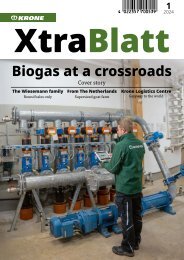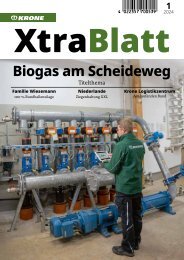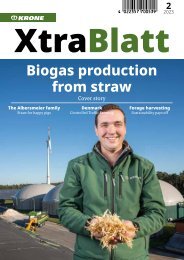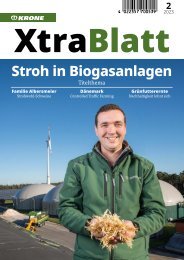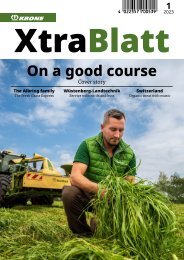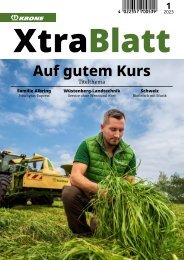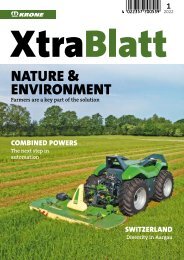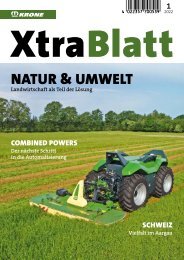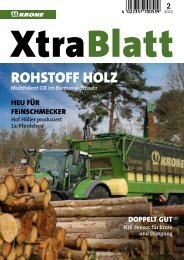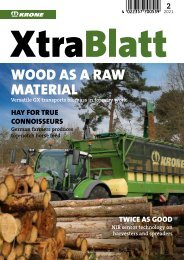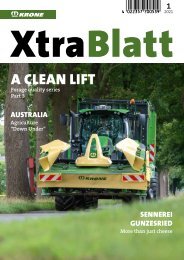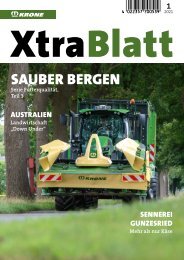XtraBlatt Issue 02-2020
Create successful ePaper yourself
Turn your PDF publications into a flip-book with our unique Google optimized e-Paper software.
ON-FARM<br />
PASTURE PIGS<br />
SWINE IN THE<br />
OPEN AIR<br />
Keeping pigs on grassland? East Friesland farmer Johannes<br />
Erchinger found this an interesting business<br />
idea. Some 25 years ago he sought a new agricultural<br />
enterprise and found it with his Berkshire swine.<br />
Contended pigs:<br />
These high-welfare piglets are<br />
grouped after weaning and then<br />
bedded daily with plentiful straw.<br />
hen Johannes Erchinger comes<br />
with the feed bucket nothing<br />
else matters. Even out on the meadows<br />
where boar and sows produce piglets<br />
the natural way, all is forgotten when<br />
the farmer appears with the feed bucket.<br />
Only seconds after he steps into the<br />
field he’s surrounded. He makes sure<br />
that every pig gets some of the pellets.<br />
There’s no fighting and even the boar<br />
that can weigh-in at up to 350 kg seems<br />
easy-going and doesn’t push the others<br />
aside. “Pigs kept outdoors are simply<br />
more relaxed”, says the farmer from<br />
Logabirum near Leer in East Friesland.<br />
This is classic dairy farming land and pig<br />
producers are scarce. Johannes Erchinger<br />
also runs a dairy herd with 80 cows, and<br />
he represents the fifth generation on this<br />
family farm. The farmyard is right in the<br />
middle of the village so there’s no way<br />
of expansion and simply moving out to<br />
build on a greenfield site never attracted<br />
him and his family. “In the second half<br />
of the 1990s I thought very hard about<br />
starting a second enterprise and finally<br />
somehow landed on the idea of pig production<br />
outdoors on pasture,” recalls the<br />
farmer. The pig breeding company PIC<br />
at that time invited him to visit a farm<br />
near Schleswig (Schleswig-Holstein) that<br />
specialised in outdoor pig production. In<br />
just a few weeks, he had completed a<br />
practical training course there for a<br />
deeper insight into this type of enterprise.<br />
Even before he’d completed the<br />
course, Johannes Erchinger had first<br />
calculations ready so that he could<br />
convince his family to start off the<br />
adventure “pasture pigs”.<br />
INITIAL<br />
RESISTANCE<br />
At first, there was some resistance in<br />
the village when his plans became<br />
known. “Pigs are associated with unpleasant<br />
odours, although this is con-<br />
nected with housed animals”, explains<br />
Johannes Erchinger, adding that pigs<br />
kept outdoors don’t smell. This is partly<br />
because of nature’s own ventilation, but<br />
mainly because the animals eat mostly<br />
grass and straw that leads to markedly<br />
less smell from the dung, one reason<br />
being that the dietary fibre binds odour<br />
compounds. The initial unrest therefore<br />
soon settled down. In fact, the pig pastures<br />
have meantime become something<br />
of an attraction in the neighbourhood.<br />
The pigs are visited often by primary<br />
school classes and Johannes Erchinger<br />
takes the opportunity to inform the kids<br />
more about farming.<br />
Starting the enterprise was investment-intensive,<br />
even without the cost<br />
of animal housing, which is of course<br />
not required. Firstly, the equipment<br />
including water troughs, arks, feeding<br />
tackle, as well as a “pig taxi” for livestock<br />
transport, all had to be bought-in – and<br />
the pastures suitably prepared. In De-<br />
20 21



